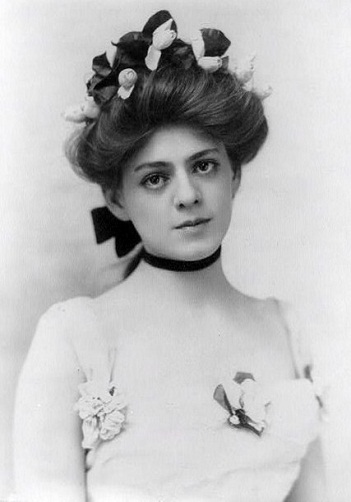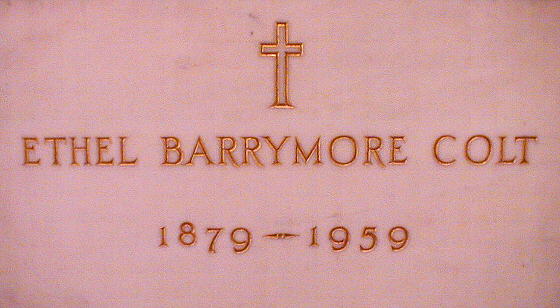Ethel Barrymore (Ethel Barrymore)

Actress. In the first half of the 20th Century, Ethel Barrymore and her brothers Lionel and John were probably the most famous family of actors in the English-speaking world. She was a legend on the New York and London stage for over 40 years. Her aristocratic poise and distinguished career earned her the sobriquet, “The First Lady of the American Theatre”. Barrymore was born Ethel Mae Blythe in Philadelphia, the daughter of actors Maurice Barrymore (family name Blythe) and Georgiana Drew. Initially trained as a concert pianist, she made her acting debut in 1894 and first appeared on Broadway opposite her uncle, John Drew, Jr., in “The Imprudent Young Couple” (1895). Working her way up from bits to leads, she enjoyed growing popularity on the road and in England and finally shot to stardom in Clyde Fitch’s play “Captain Jinks of the Horse Marines” (1901). Barrymore went on to star in some three dozen Broadway plays, excelling in contemporary dramas and revivals of the classics, though audiences favored her in sophisticated comedy. Her outstanding theatrical productions include “A Doll’s House” (1905), “Alice Sit-By-the-Fire” (1906), “Trelawney of the Wells” (1911), “Declassee” (1919), “The School for Scandal” (1923), “The Second Mrs. Tanqueray” (1924), and “The Constant Wife” (1926). She was an early supporter of the Actors’ Equity union and played a visible role in the 1919 Equity strike that virtually shut down Broadway for a month. In 1928, entertainment impresarios Lee and J.J. Shubert built Broadway’s Ethel Barrymore Theatre as a showcase for her talent. She opened the venue in “The Kingdom of God” (1928) but seldom performed there afterward. Her final stage hit was “The Corn is Green” (1940). Barrymore’s movie career was more spotty. She starred in a dozen silent films during the World War I years, though she did them only for the money and made no secret of her disdain for Hollywood (which she called “a gaudy, nightmarish set built up in the desert”). Apart from an isolated role in MGM’s “Rasputin and the Empress” (1933), in which she co-starred with her brothers, she made no films until Cary Grant invited her to play his mother in the sentimental drama “None but the Lonely Heart” (1944). She won an Academy Award as Best Supporting Actress and, at 65, decided to end her career as a character player in films. Barrymore nabbed further Oscar nominations for “The Spiral Staircase” (1946), “The Paradine Case” (1947), and “Pinky” (1949), and was equally impressive in “The Farmer’s Daughter” (1947), “Moonrise” (1948), and “Portrait of Jennie” (1949). Unimpressed by the accolades heaped upon her throughout her life, Barrymore never kept so much as a scrapbook, saying, “Why clutter up the house with a lot of dead history?” In her free time she indulged her two passions, baseball and collecting rare books. The last surviving member of the “Fabulous Barrymores”, she died two months shy of her 80th birthday, whispering, “Is everybody happy? I want everbody to be happy. I know I’m happy”. Barrymore was married to stockbroker Russell Griswold Colt from 1909 to 1923. Their three children, Ethel, Samuel, and John Drew all became actors, with variable success. (
Born
- August, 15, 1879
- USA
- Philadelphia County, Pennsylvania
Died
- June, 18, 1959
- USA
- Los Angeles County, California
Cemetery
- Calvary Cemetery
- Los Angeles County, California
- USA



